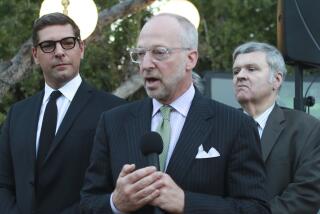Who fleeced the city of Bell?
As the trial of former Bell Assistant City Manager Angela Spaccia gets underway in downtown L.A., lawyers are gearing up for an all-out fight over this nearly irrelevant question: Who was the mastermind behind the widespread graft and sweeping corruption in the city?
Spaccia claims to have been a victim of Robert Rizzo, the city manager who has long been portrayed as the chief culprit in the campaign to defraud the city. Rizzo was charged with 69 felony counts to Spaccia’s 13. And he was her boss, the man who ran Bell for 17 years. But now that he has reached an agreement with prosecutors to plead no contest to dozens of felony charges, his lawyers have begun to describe Spaccia as the driving force behind the machinations. Rizzo intends to testify against her.
What a spectacle! These two characters who, if the allegations and documents are to be believed, together plundered the small working-class city have turned on each other in a desperate effort to save their own skins. Sure, it was Rizzo who earned $1.18 million in salary, vacation and sick leave in 2010, but Spaccia didn’t do badly herself at $564,000. The usual assumption is that the boss calls the shots and the underling follows orders, and there’s not yet much reason to doubt that was the case here. But there are certainly indications that Spaccia was deeply involved, as shown by her now-famous back-and-forth with the incoming police chief.
He wrote to Spaccia: “I am looking forward to seeing you and taking all of Bell’s money?!” She responded: “LOL …You can take your share of the pie … just like us. [Rizzo] has an expression he likes to use on occasion, Pigs get Fat … Hogs get slaughtered!!!! So as long as we’re not Hogs … All is well!”
Until there’s a verdict, we can’t say for sure who did what. But every indication is that these characters were not victims but willing participants. Their eleventh-hour efforts to blame one another, presumably to reduce their own punishments, should come as no surprise.
The tragedy of Bell is that it is a working-class city of immigrants where a quarter of the residents live below the poverty line, yet Rizzo and Spaccia are charged with complex, often secret manipulations that allowed them to live lavishly on exorbitant taxpayer-funded salaries. According to prosecutors, they wrote their own contracts, assuring themselves generous raises that they illegally hid from the public. Not surprisingly, Bell became a national symbol of municipal corruption.
The best to be hoped for now is that Rizzo’s plea and a swift conclusion to Spaccia’s trial will give the city of Bell some sense of resolution. To the credit of its residents, the city has begun to clean up its municipal act, and voters seem to have internalized a lesson we all need to learn: the importance of being involved in local government and of asking questions. What happened in Bell was certainly the result of venality on the part of officials, but if residents had been watching more closely, the worst of it might have been avoided.
More to Read
A cure for the common opinion
Get thought-provoking perspectives with our weekly newsletter.
You may occasionally receive promotional content from the Los Angeles Times.






